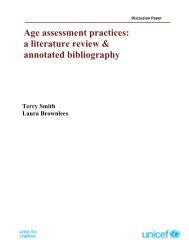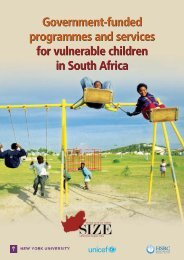Third and Fourth Periodic Report on CRC - Unicef
Third and Fourth Periodic Report on CRC - Unicef
Third and Fourth Periodic Report on CRC - Unicef
You also want an ePaper? Increase the reach of your titles
YUMPU automatically turns print PDFs into web optimized ePapers that Google loves.
<str<strong>on</strong>g>Third</str<strong>on</strong>g> <str<strong>on</strong>g>and</str<strong>on</strong>g> <str<strong>on</strong>g>Fourth</str<strong>on</strong>g> <str<strong>on</strong>g>Periodic</str<strong>on</strong>g> <str<strong>on</strong>g>Report</str<strong>on</strong>g><br />
THE CHILDREN ACT, 1974 (BANGLADESH’S CONTRIBUTION)<br />
The aims <str<strong>on</strong>g>and</str<strong>on</strong>g> goals thus spelled out led to the multitude of nati<strong>on</strong>s enacting laws incorporating the recommendati<strong>on</strong>s <str<strong>on</strong>g>and</str<strong>on</strong>g><br />
embodiments of the internati<strong>on</strong>al instruments. Let us examine the background to the enactment of our Children Act, 1974<br />
in order to see its applicability in the criminal justice delivery system in our country.<br />
The first introducti<strong>on</strong> of law in our parts referring to trial of youthful offenders was in the Bengal Children Act, 1922, which<br />
was localised to Kolkata <str<strong>on</strong>g>and</str<strong>on</strong>g> its suburbs as well as the Port of Kolkata <str<strong>on</strong>g>and</str<strong>on</strong>g> Howrah. There was also provisi<strong>on</strong> to extend it<br />
to other parts of Bengal. Later by amendment, secti<strong>on</strong> 29B was added by the Code of Criminal Procedure (Amendment) Act,<br />
1923 (XVIII of 1923). Previous to that <strong>on</strong>ly c<strong>on</strong>finement of youthful offenders was dealt with by the Reformatory Schools Act<br />
1897.<br />
Secti<strong>on</strong> 29B of the Code provides as follows:<br />
"29B. Any offence, other than <strong>on</strong>e punishable with death or transportati<strong>on</strong> for life, committed by any pers<strong>on</strong> who at the<br />
date when he appears or is brought before the Court is under the age of fifteen years, may be tried by a District<br />
Magistrate or the Chief Metropolitan Magistrate, or by any Magistrate specially empowered by the Government to<br />
exercise the powers c<strong>on</strong>ferred by or under any law providing for the custody, trial or punishment of youthful offenders,<br />
by any Magistrate empowered by or under such law to exercise all or any of the powers c<strong>on</strong>ferred thereby."<br />
We are not aware that any special court was set up to hear matters relating to youthful offenders specifically either under<br />
the Bengal Children Act or the Code of Criminal Procedure. Both those provisi<strong>on</strong>s were repealed/abolished by the Children<br />
Act, 1974.<br />
LEGISLATION IN EXERCISE OF CONSTITUTIONAL POWER<br />
We believe that the Children Act 1974 was promulgated as a direct manifestati<strong>on</strong> of Article 28(4) of the C<strong>on</strong>stituti<strong>on</strong>, which<br />
has been placed in the Part III – under the title "Fundamental Rights", <str<strong>on</strong>g>and</str<strong>on</strong>g> at the same time in resp<strong>on</strong>se to, <str<strong>on</strong>g>and</str<strong>on</strong>g> with a<br />
view to fulfilling the m<str<strong>on</strong>g>and</str<strong>on</strong>g>ate of, the relevant internati<strong>on</strong>al instruments of the UN menti<strong>on</strong>ed above. Article 28(4) of the<br />
C<strong>on</strong>stituti<strong>on</strong> provides as follows:<br />
"Nothing in this article shall prevent the State from making special provisi<strong>on</strong> in favour of women or children or for the<br />
advancement of any backward secti<strong>on</strong> of citizens."<br />
Thus the framers of the C<strong>on</strong>stituti<strong>on</strong> have given the power even to promulgate discriminatory laws favouring the womenfolk<br />
<str<strong>on</strong>g>and</str<strong>on</strong>g> children. Hence it can be said that the Act is a beneficent legislati<strong>on</strong> purposely enacted to give beneficial effects to a<br />
particular community of women <str<strong>on</strong>g>and</str<strong>on</strong>g> children <str<strong>on</strong>g>and</str<strong>on</strong>g> <strong>on</strong>ce enacted the rights which accrue cannot be frittered away by<br />
subsequent enactment.<br />
The Act incorporates provisi<strong>on</strong>s of internati<strong>on</strong>al covenants in order to safeguard the juvenile from exposure to the rigours of<br />
Court process <str<strong>on</strong>g>and</str<strong>on</strong>g> the stigma of trial <str<strong>on</strong>g>and</str<strong>on</strong>g> c<strong>on</strong>victi<strong>on</strong>. Hence the requirement for separate trial from adults has been<br />
incorporated in secti<strong>on</strong> 6 of the Act. It may be noted that secti<strong>on</strong> 6(2) of the Act emphatically gives this provisi<strong>on</strong> precedence<br />
over all other provisi<strong>on</strong>s of any laws which may dictate joint trials, including secti<strong>on</strong> 239 of the Code of Criminal Procedure.<br />
In this regard comparis<strong>on</strong> may be made with the system prevalent in Engl<str<strong>on</strong>g>and</str<strong>on</strong>g>. It appears that in case of serious offences<br />
triable by the Crown Court, there is a discreti<strong>on</strong> given to the Juvenile Court whether or not to allow the juvenile to be tried<br />
with the adult <str<strong>on</strong>g>and</str<strong>on</strong>g>/or for the trial to take place in the Crown Court. With all due respect, such a provisi<strong>on</strong> effectively waters<br />
down the rights given to the juvenile to be ‘protected’ from the terrorizing harshness of the criminal justice system <str<strong>on</strong>g>and</str<strong>on</strong>g> is<br />
c<strong>on</strong>trary to the spirit of the internati<strong>on</strong>al instruments, menti<strong>on</strong>ed above, which enjoin segregati<strong>on</strong> from adult offenders. We<br />
note that our legislature has catered for cases of youthful offenders involved in serious crimes by enacting secti<strong>on</strong> 5(3) of<br />
the Act, which provides as follows:<br />
150
















